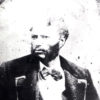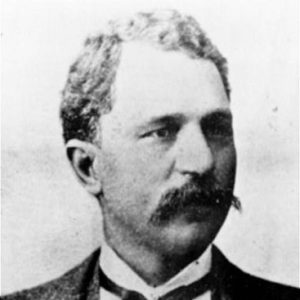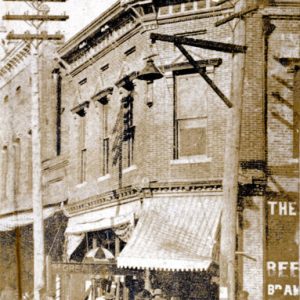calsfoundation@cals.org
Ferd Havis (1846–1918)
aka: Ferdinand Havis
Ferdinand Havis was born a slave but became an alderman, state representative, assessor, and county clerk, and was called the “Colored Millionaire” of Pine Bluff (Jefferson County).
Ferd Havis was born in Desha County on November 15, 1846, the son of John Havis, a white farmer, and a slave mother. In 1859, Havis’s father moved his operations to Jefferson County. Havis received a little common school education and learned the barbering trade. Later, he owned a profitable barbershop on West Court Street in Pine Bluff. The shop later moved to Barraque Street.
Havis married three times. His first wife, Dilsa, died childless in 1870. His second wife, Geneva, died on August 4, 1886; they had one child, Ferda. He married his third wife, Ella Cooper, on November 2, 1887; he and Ellen had three children: Viessy, Alma, and Felton.
Havis began his political career in the 1870s. He was elected as a Third Ward alderman in 1872, serving five terms total. He served in the state House of Representatives in 1873 but resigned to accept the post of Jefferson County assessor in 1873. Governor Elisha Baxter commissioned him a colonel in the Arkansas Militia in April 1874.
For twenty years, Havis served as chairman of the Jefferson County Republican Party. He served as a delegate to the National Republican Convention in 1880, which met in Chicago, Illinois. During that convention, he was one of the 306 delegates who supported Ulysses S. Grant in his bid for the presidential nomination. Havis became the vice president of the Arkansas Republican Party in 1888.
In 1882, he was elected Jefferson County circuit clerk and held this position for five terms. In 1883, a grand jury investigated the county clerk’s office and learned that Havis had received double pay for his service; however, the grand jury did not indict him. His career was affected somewhat. For example, he did not get the postmaster position for which he was recommended.
Relationships between the races changed for the worse after Reconstruction. But the charismatic Havis had some influence with both racial groups, along with their support.
Besides owning a barbershop and his own home, Havis owned approximately 2,000 acres of land, several tenement houses, and was part owner of a local tavern. The Ferd Havis Building, which was a popular meeting place for the black society of Pine Bluff, was located on Third and Main streets. Havis told the Pine Bluff Press Eagle that while he was in the tavern business, he never allowed his saloon to be opened on Sunday. Technically, this was true, as he opened the tavern on Saturday night. It closed some time in the wee hours of Sunday morning, not to open again the rest of the day on Sunday. On the police court docket of Pine Bluff in 1882, every Monday from July 4 until November, a certain F. Havis pleaded guilty to “Sabbath breaking” and paid a weekly fine of five dollars.
In 1889, Havis was the Republican nominee for the U.S. Senate, but he did not win the election. In 1898, President William McKinley nominated him for the position of Pine Bluff postmaster, but the Senate refused to confirm his appointment. Pine Bluff white citizens, along with the local newspaper, had opposed his nomination. He never became postmaster. Within two years, African Americans were eliminated from nearly all public offices in Arkansas.
Havis died at his home at 920 West Barraque, probably of a heart attack, on August 25, 1918, and is buried in Bellwood Cemetery in Pine Bluff.
For additional information:
Leslie, James. “Ferd Havis: Jefferson County’s Black Republican Leader.” Jefferson County Historical Quarterly 8.1 (1979): 19–29.
Morgan, Marian B., and Izola Preston. The Arkansas African American Quizbook. Cane Hill, AR: ARC Press, 1993.
Richardson, Clement. The National Cyclopedia of the Colored Race. Montgomery, AL: National Publishing Co., 1919.
Gordon D. Morgan
Fayetteville, Arkansas
This entry, originally published in Arkansas Biography: A Collection of Notable Lives, appears in the CALS Encyclopedia of Arkansas in an altered form. Arkansas Biography is available from the University of Arkansas Press.
 African American Legislators (Nineteenth Century)
African American Legislators (Nineteenth Century) Ferd Havis
Ferd Havis  Ferd Havis Building
Ferd Havis Building 




Comments
No comments on this entry yet.